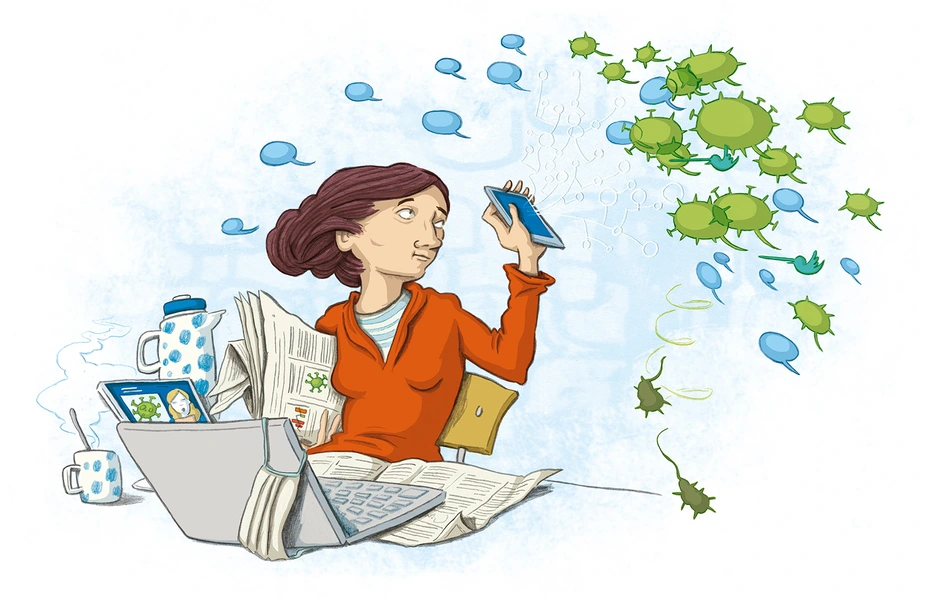The fake news pandemic
Dr. Peter Strunk about how to handle the ‘infodemic’
Whether it’s climate change deniers, election interferers, or neo-Nazis inciting hatred against refugees - their most important tool for manipulating the public is the peddling of fake news and conspiracy theories on social media. At the outset of the coronavirus pandemic, wrongful reporting was fuelling the panic worldwide. Suddenly, with attention shifting from demagogues to virologists, many people do not seem as susceptible to this anymore. Public broadcasting, newspapers, and magazines are, once again, enjoying great popularity. But will this trend continue?
When the coronavirus pandemic swept over us in mid-March 2020, it was followed by a wave of fake news and misinformation. It seemed as if the hour had struck for populists of all stripes, far-right extremists, conspiracy theorists, sectarians, and other forces of obscurantism. On 16 March 2020, the editors of ‘Süddeutsche Zeitung’ deemed it appropriate to provide their readers with a ‘manual’ for exposing false stories on social media. One should ‘never publish something on impulse, even if clicking a share, forward, or retweet-button is enough do so.’ They also recommended validating statements ‘with two reliable sources’ and to avoid forwarding chain letters. A day later, the paper gave a stern warning that the ‘infodemic’ was as dangerous as the pandemic itself.
‘Süddeutsche Zeitung’ is a leading national newspaper and one that is a preferred source of information for the decision-makers of this republic. It is thus alarming that its editors should feel compelled to remind their overwhelmingly educated readership of something that everybody with a high-school or university diploma should be familiar with: critically evaluating information.
We live in an information society. Never have our minds been flooded by so much information – around the clock and on all channels. Especially online, there is a filter bubble for every taste as long as it can attract attention. Attention that fake news, conspiracy theories, hate and demagoguery can attract with ease.
Now, amid the crisis, we observe a change: the futurologist Mathias Horx ‘looked back’ into the future of the pandemic and predicted that fake news would ‘rapidly lose its market value’ and, ‘although currently treated like chopped liver’, so would conspiracy theories. Indeed, while many online communities seem undeterred and continue to light up a firework of misinformation, the general public is turning back to classic news media en masse – on 22 March 2020, twelve million people watched the ‘Tagesschau’, Germany’s main public news programme. Holger Stark wrote in the weekly newspaper ‘Die Zeit’: ‘Journalism is precisely not the unchecked dissemination of the latest rumour. Journalism is examination, verification, contextualisation.’ Conspiracy theories, on the other hand, are often cynical and ‘most often lacking any substance.’
We have already gained at least one insight from today’s crisis: those who want to be well-informed must seek reputable sources. This has now also been understood by the Big Tech companies. When searching for the word ‘Coronavirus’ on one of the large online platforms, users are directed to the sites of the Robert Koch Institute or the Federal Health Ministry. In ‘Frankfurter Allgemeine Zeitung’ on 21 March 2020, Justus Bender commented on this in no uncertain terms: ‘Algorithms are now doing what they never did before: they are tamping down on drivel.’
Will this trend continue? Will false reports continue to be fished out from the net? Or will social network providers fall back into old habits – while we follow? Will all of us and scientists, as creators of knowledge and fact-givers, make sure that the digital society will also be a well-informed one? We should all have a great interest in a healthy media landscape, because nothing puts a greater value on our statements than to be scrutinised by a critical and independent press.
Von Dr. Peter Strunk für Adlershof Journal
